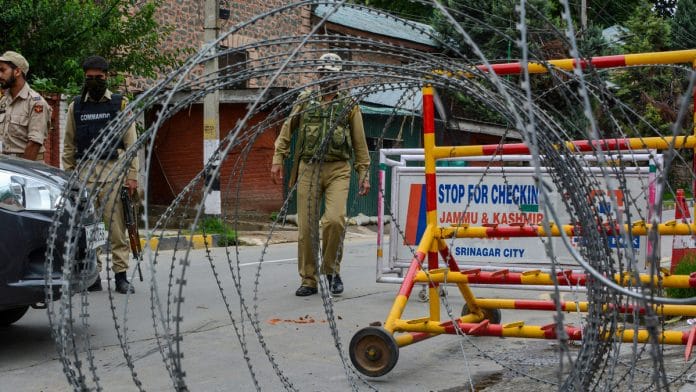New Delhi: The special committee that was constituted to look into the issue of restoring 4G internet in Jammu and Kashmir has decided against resuming the services, the Union Ministry of Home Affairs (MHA) informed the Supreme Court earlier this week.
In an affidavit filed Tuesday (21 July), in response to a contempt petition against the central government, the MHA said the committee will review its decision after two months.
The home ministry also said situation in the union territory will be reviewed by other competent authorities for the next two months. If there is improvement, appropriate action would accordingly be taken.
MHA’s affidavit follows a direction given on 16 July by a Supreme Court bench, led by Justice N.V. Ramana, to answer allegations of contempt raised against it in a petition by the Foundation of Media Professionals (FMP).
The FMP petition had sought action against government officials for allegedly defying the top court’s order to form the special committee. The bench had then observed that the government should have put the committee’s decision, to not resume 4G internet services in J&K, in the public domain.
On 11 May, the top court had directed the government to constitute a three-member high-powered committee to look into the issue of restoring 4G internet services in J&K. The committee was tasked to determine the necessity of continued restriction of mobile internet speed to only 2G bandwidth there.
Headed by the MHA secretary, the committee also constitutes the secretary of the Department of Telecom (DoT) and chief secretary of J&K as its members.
Also read: Omar Abdullah’s Delhi visit, his advisor’s op-ed trigger talk of ‘reconciliation’
‘Inputs on prevailing situation taken before final decision’
Signed by Deputy Secretary, Legal and Constitution (MHA), Dharmendra Kumar, the affidavit has refuted allegations of non-compliance levelled against it by the FMP.
It states that the top court’s order was complied “faithfully” by officials concerned of the central and J&K governments.
“I submit the contentions regarding the alleged failure to constitute this special committee through a notification or order of the government are wholly wrong and misconceived,” the affidavit reads.
It also states that a separate government notification was not required since the committee was formed by the court’s directive.
Committee takes recent terror incidents into account
The special committee had held two meetings before it took a decision to not ease restrictions on internet services in J&K, the affidavit states.
The first meeting was held on 15 May, four days after the court pronounced its ruling to form the panel. In this, suggestions made by the FMP before the court were debated and the prevailing security situation as well as impact of internet restrictions in J&K were looked into.
The meeting remained inconclusive as the committee decided to obtain further inputs in regard to the prevailing situation on the ground level.
On 6 June, the committee met again to analyse the fresh inputs that were received.
“A thorough and comprehensive and consideration of all facets of the matter, including the feasibility of alternatives suggested by the petitioners as well as the recent occurrence of terrorism-related incidents in the region, was carried out.
“…based on a considered and wide-ranging assessment of the prevailing situation in this sensitive region, the committee arrived at a decision that no further relaxation of the restrictions on internet services, including 4G services, could be carried out at present,” the affidavit states.
Also read: SC quoted jurist Ronald Dworkin in passing. Kashmir 4G order shows it must read him in full






